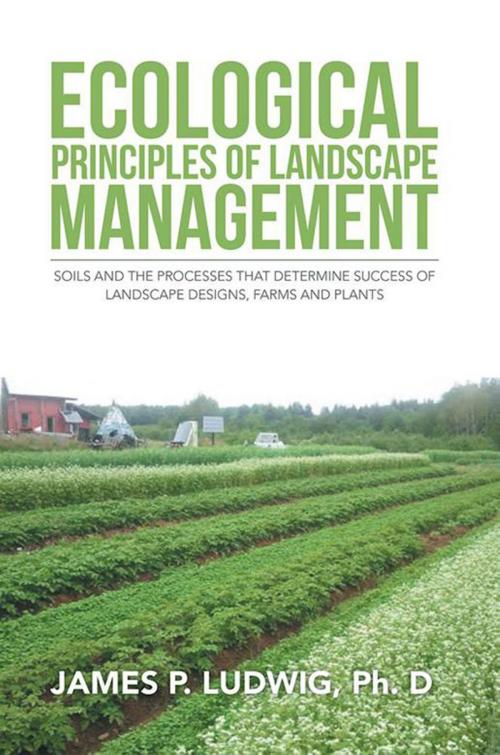Ecological Principles of Landscape Management
Soils and the Processes That Determine Success of Landscape Designs, Farms and Plants
Nonfiction, Science & Nature, Nature, Environment, Ecology| Author: | James P. Ludwig Ph.D | ISBN: | 9781493153022 |
| Publisher: | Xlibris US | Publication: | December 26, 2013 |
| Imprint: | Xlibris US | Language: | English |
| Author: | James P. Ludwig Ph.D |
| ISBN: | 9781493153022 |
| Publisher: | Xlibris US |
| Publication: | December 26, 2013 |
| Imprint: | Xlibris US |
| Language: | English |
During the last decade many graduate-level Landscape Architecture students have taken our ecology classes tailored to their profession. However, relatively few students training to create attractive living spaces actually had significant basic fundamental knowledge of ecology, chemistry or soils. These deficiencies became apparent when elegant landscape designs failed because plants did not thrive, grew poorly or even died. Similarly, many farmers and gardeners are ill-equiped to understand the complexity of their soils, interpret soil testing data and appreciate natural soil processes affecting their crops. Other problems arise when storm water pulses in urban, suburban or farmed settings caused flooding, erosion or slope failures. These problems can be addressed successfully with basic knowledge of soils, soil mechanics, hydrology and ecology. Failure to appreciate the inexorable natural processes affecting soils increases the probability that a landscape plan however elegant and aesthetically pleasing the design may be - or a crop will fail to grow and perform as expected. Similarly, many friends and businesses we have evaluated had experienced repeated failures in the management of their home sites, commercial or industrial properties. The problems arising from the lack of this critical knowledge can be very expensive for the professional or individual. Repeated failures with inadequate plant performance prepared by a professional designer bode ill for a career. All too often, professionals have been replaced by the municipalities, corporations and developers who hired them after easily prevented failures emerged owing to inadequate basic ecological and soils training. For the individual land or business owner who tries to manage a difficult property, or if one has the proverbial black thumb, these failures lead to great personal frustration, a deep sense of inadequacy and abandonment of vision and goals. Sometimes owners simply opt for an engineered hardscape that obliterates the ecological and natural values of a well-managed landscape. Farmers may see their incomes fall when seemingly intractable conditions develop. For the most part, these are preventable problems that can be avoided by sound ecological management and basic knowledge of how soils develop, interact and function with the plants they nourish in the local climate. This book has been compiled to address the fundamental aspects of plant ecology and soils for the landscape professional, farmer and individual alike. However, it is not intended for the professional ecologist, soil scientist or agronomist. The most important aspects of these fields have been cherry-picked and much was omitted for this book. Specialists will find this book incomplete and probably too generalized. Regardless, the principles of effective soils management for competent ecological designs are the same for the landscape designer, homeowner, organic gardener or farmer. In the 21st century, we can no longer afford to pay the replacement costs of failed plantings, or any sort of site repair or redevelopment. Resource depletion, the increasingly critical need to recycle lands including whole landscapes (especially in urban settings), and ever rising input costs for all forms of management support an argument for a practical manual that addresses the ecological fundamentals of good land and soil management at every level. New concepts for land management emerge every day as economic stressors force every organization and professional to look at issues and ideas long forgotten such as gardening to raise a significant portion of minimally contaminated food by families living in urban and suburban settings. Our societies are changing rapidly. Human population densities continue to increase rapidly even as resources become ever more scarce and expensive. In one sense, we need to recapture a great deal of the common sense and knowledge that was lost afte
During the last decade many graduate-level Landscape Architecture students have taken our ecology classes tailored to their profession. However, relatively few students training to create attractive living spaces actually had significant basic fundamental knowledge of ecology, chemistry or soils. These deficiencies became apparent when elegant landscape designs failed because plants did not thrive, grew poorly or even died. Similarly, many farmers and gardeners are ill-equiped to understand the complexity of their soils, interpret soil testing data and appreciate natural soil processes affecting their crops. Other problems arise when storm water pulses in urban, suburban or farmed settings caused flooding, erosion or slope failures. These problems can be addressed successfully with basic knowledge of soils, soil mechanics, hydrology and ecology. Failure to appreciate the inexorable natural processes affecting soils increases the probability that a landscape plan however elegant and aesthetically pleasing the design may be - or a crop will fail to grow and perform as expected. Similarly, many friends and businesses we have evaluated had experienced repeated failures in the management of their home sites, commercial or industrial properties. The problems arising from the lack of this critical knowledge can be very expensive for the professional or individual. Repeated failures with inadequate plant performance prepared by a professional designer bode ill for a career. All too often, professionals have been replaced by the municipalities, corporations and developers who hired them after easily prevented failures emerged owing to inadequate basic ecological and soils training. For the individual land or business owner who tries to manage a difficult property, or if one has the proverbial black thumb, these failures lead to great personal frustration, a deep sense of inadequacy and abandonment of vision and goals. Sometimes owners simply opt for an engineered hardscape that obliterates the ecological and natural values of a well-managed landscape. Farmers may see their incomes fall when seemingly intractable conditions develop. For the most part, these are preventable problems that can be avoided by sound ecological management and basic knowledge of how soils develop, interact and function with the plants they nourish in the local climate. This book has been compiled to address the fundamental aspects of plant ecology and soils for the landscape professional, farmer and individual alike. However, it is not intended for the professional ecologist, soil scientist or agronomist. The most important aspects of these fields have been cherry-picked and much was omitted for this book. Specialists will find this book incomplete and probably too generalized. Regardless, the principles of effective soils management for competent ecological designs are the same for the landscape designer, homeowner, organic gardener or farmer. In the 21st century, we can no longer afford to pay the replacement costs of failed plantings, or any sort of site repair or redevelopment. Resource depletion, the increasingly critical need to recycle lands including whole landscapes (especially in urban settings), and ever rising input costs for all forms of management support an argument for a practical manual that addresses the ecological fundamentals of good land and soil management at every level. New concepts for land management emerge every day as economic stressors force every organization and professional to look at issues and ideas long forgotten such as gardening to raise a significant portion of minimally contaminated food by families living in urban and suburban settings. Our societies are changing rapidly. Human population densities continue to increase rapidly even as resources become ever more scarce and expensive. In one sense, we need to recapture a great deal of the common sense and knowledge that was lost afte















